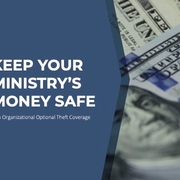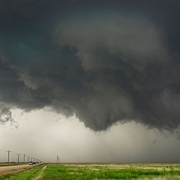Financial Red Flags and Proactive Practices
January 13, 2016

Financial dishonesty can happen anywhere. Churches and ministries are especially susceptible to issues of financial dishonesty involving theft from ministry accounts. Regardless of the size of your ministry, it’s always important to be aware of “red flags” and take steps to promote financial accountability at your church or ministry including the following:
Red Flag One: The one man show. Try to avoid having the same person count, record and deposit the money each week. Instead, split the responsibilities between more than one person approved to handle money on behalf of the ministry as a check and balances system.
Red Flag Two: The lone counter. Leaving one person in a room to count the money creates temptation. Carefully select two qualified people to collect and count the money in a secure room. Conduct a background check on each of the individuals you select. Don’t allow the money counters to bring in bags, purses, or briefcases while they count.
Red Flag Three: The charismatic do-gooder. Don’t assume that the person handling the money is trustworthy just because they enthusiastically do the record keeping and rarely require assistance. Instead reconcile bank statements by having the treasurer or another high-level person compare each month’s bank statement with the church’s records on tithing and deposits.
In addition to keeping an eye out for these red flags, consider these additional tips for minimizing financial fraud in your ministry.
Hold money meetings. Organize monthly meetings with church leaders to analyze financial statements. When everyone is up to speed on the church finances it is easier to spot inconsistencies.
Put a policy on paper. Document your church’s or ministry’s policy in writing to ensure consistency and eliminate the excuse of ignorance from a dishonest member.
Do your homework. Perform annual background checks and run annual credit reports on the people responsible for church funds. It might feel awkward, but individuals in charge of money need to be above reproach.
Require annual external audits. Bringing in someone from the outside to do an audit may help eliminate biased opinions on church finances.
- November 7, 2023
- Stop Plumbing Leaks with FloLogic
-

-
Water and the damage it brings can be one of the most devastating property claims a ministry or organization can experience. Fortunately, there's a solution that identifies leaks when they start, as small as 1/2-ounce-per-minute. It's called FloLogic.
- September 7, 2023
- Increasing Donor Trust
-

-
The ability to inspire others to give is a blessing. Because fundraising can be both exciting and challenging, there are some important details to consider that can help your donors, and organization, have a smooth and successful experience.
- July 31, 2023
- What to Know About Loaning Your Ministry Vehicle
-

-
Has your church or school ever been asked to loan or rent one of your vans or buses to another ministry? Rather than running the risk of loaning or renting your own vehicle, you could consider aiding them financially in renting or chartering a vehicle from a rental agency.
- May 9, 2023
- Save Money with One Change
-

-
A periodic review of your insurance policy is a good way to make sure your ministry is protected for its most current needs, but it also may offer the opportunity to find some significant savings.
- January 26, 2023
- Brotherhood Mutual Foundation Kingdom Advancing Grant
-

-
For the second year, the Brotherhood Mutual Foundation is offering the Kingdom Advancing Grant to innovative Christian church programs that are transforming local communities through ministry.
- January 26, 2023
- Responding to Mission Issues
-

-
Having insurance coverage specifically designed for long-term international missions helps protect your people and organization from the financial impact caused by injuries, lawsuits, property damage, and more.
- January 9, 2023
- Better Achieve Your Mission in 2023
-

- November 10, 2022
- Evaluate Your Ministry's Fire Safety Plan
-

-
With the holiday season right around the corner, it’s wise for ministries to evaluate their fire safety plan. Whether your ministry is hosting a holiday party, prepping treats for charity, or running a community kitchen, make sure you’re well-prepared with these tips.
- September 9, 2022
- School is Back in Session
-

-
As school is back in session, it’s important to make sure your school is equipped with the correct safety procedures. Thinking about your school’s physical security as a series of layers can help you find gaps in your plan. Transportation and volunteers are just two important aspects of your school safety plan to think about.
- July 15, 2022
- Shepherding Ministries in a Time of Change
-

-
Anyone who turns on the news, flips through a magazine, or browses the web can see that American society and culture are experiencing rapid transitions. Some ministries have valid concerns that issues surrounding societal shifts may expose them to negative publicity, governmental scrutiny, or litigation.
- May 12, 2022
- Five Common Tricks of Cyber Scammers
-

-
Cyber security is increasingly crucial in our technologically advanced world. Scammers use many schemes when attempting to steal your data, but you can outsmart them by understanding their methods.
- March 1, 2022
- Resolving Conflict in the Church
-

-
When conflict occurs in the church, it can threaten the unity of a congregation. Experts say the only way to heal conflict is to acknowledge and address it. But how?
- January 25, 2022
- Keep Your Ministry's Money Safe
-

-
Theft isn’t just an issue for banks and large companies. Sometimes the kind and caring nature of your ministry is exactly what makes you a target. Organizational Optional Theft Coverage helps to assure that, if a thief takes advantage of your institution, what’s lost can be restored.
- September 1, 2021
- Prepare Your Ministry for Another Active Earthquake Season
-

-
Earthquakes are starting to rumble the earth again. An earthquake’s impact can range from being a minor annoyance to causing a major disaster. The safety planning you do now can help your ministry protect its people and property.
- July 22, 2021
- Thousands in Relief Funding Available to Ministries Through the Employee Retention Credit
-

-
Most ministry leaders don’t realize there is funding available to non-profit employers including churches, schools, colleges, and camps. This post includes some highlights about the credit and guidance on where to start to see if your ministry is eligible.
- June 17, 2021
- Prepare Your Ministry for Another Active Hurricane Season
-

-
The Atlantic hurricane season officially started June 1, and weather experts say this season is likely to produce above-normal activity. Take action to prepare your ministry to withstand a hurricane now, so you’re not scrambling when a watch or warning is posted.
- April 19, 2021
- Take Time to Review Your Ministry's Child Protection Plan
-

-
April is National Child Abuse Prevention Month. Though child abuse may not be something you could ever imagine happening within your ministry, sexual abuse of a minor is one of the top five reasons churches end up in court, according to Church Law & Tax. Studies also show that a child is much more likely to be sexually abused by a trusted adult than a stranger.
- March 16, 2021
- Prepare for Severe Spring Storms Now
-

-
When severe storms strike, they can produce high winds and tornadoes. Damaging winds can wreak havoc on your ministry’s property and to buildings. A high wind event can crash debris through your windows, strip your siding, down trees on your parking lot, peel shingles off your roof, and fling back the flashing.
- February 25, 2021
- Catalytic Converter Theft on the Rise: Protect Ministry Vehicles
-

-
Thieves are taking advantage of soaring precious metal prices. Take steps to protect your ministry’s vehicles and property.
- November 23, 2020
- COVID-19 and the Christmas Season
-

-
Preparing for this Christmas season may require additional creativity, due to the uncertainty of what COVID-19 may bring in our local community.